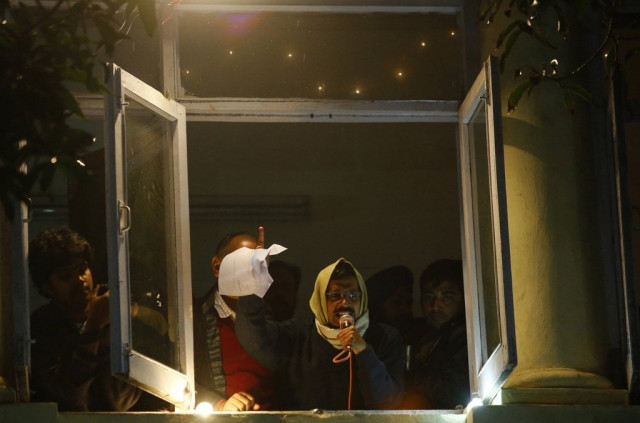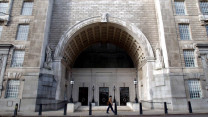‘Principled’ stance: New Delhi CM resigns over graft bill row
Quits after just 49 days, the shortest tenure any govt in Delhi has ever had.

Delhi's Chief Minister Arvind Kejriwal (C), chief of the Aam Aadmi (Common Man) Party (AAP), addresses his supporters after announcing his resignation from the party headquarters in New Delhi February 14, 2014. PHOTO: REUTERS
It was the shortest tenure any government in Delhi has ever had. After just 49 days in power, Delhi Chief Minister Arvind Kejriwal and his cabinet colleagues from the Aam Aadmi Party (AAP) resigned from the Delhi government on Friday, leaving their rivals – the Congress and the Bharatiya Janata Party (BJP) – with what may prove to be an even bigger political headache.
“I am a small man and I have come from among you. To stick to our principles, we are ready to give up the chief minister’s post a hundred times over,” Kejriwal said at the end of a day of high drama, emotion and passion.
“I believe in the constitution of India. I took oath of office to uphold the constitution, not to uphold the orders of the central government,” he told a crowd of charged AAP supporters, all of whom were waving a broom – the party’s election symbol.

Kejriwal resigned after the Delhi Assembly defeated a motion to pass the Jan Lokpal bill, an anti-corruption legislation which seeks the appointment of an independent body to investigate graft cases.
The bill had to be routed through the lieutenant governor of Delhi and the home ministry since Delhi is a centrally administered territory. Kejriwal and his colleagues had objected to this route, saying the Constitution was silent on the central government having any jurisdiction on the activities of the state government or the assembly.
A day before, fisticuffs broke out in the legislative assembly when BJP clashed with AAP.
The Congress and BJP have said they have objections not against the Jan Lokpal bill, but the manner in which Kejriwal and his colleagues were forcing the agenda and projecting themselves as the sole crusaders against corruption.
Kejriwal had accused the two parties of banding together against him after his government filed police complaints of corruption against India’s biggest industrialist, Mukesh Ambani. The Ambanis, Kejriwal alleged, colluded with the ruling Congress government to inflate the price of natural gas extracted from offshore oil blocks by the Ambani group.
He claimed the Congress and BJP had taken a stance against his government after being influenced by the Ambanis – an allegation hotly denied by the two parties.
Kejriwal’s resignation will free him and his party members from the responsibility of running the capital and will allow them to focus on campaigning all over the country – something the Congress had hoped to avoid when it helped the AAP form the government.
Delhi Lieutenant Governor Najeeb Jung will rule Delhi for the foreseeable future.
Published in The Express Tribune, February 15th, 2014.


















COMMENTS
Comments are moderated and generally will be posted if they are on-topic and not abusive.
For more information, please see our Comments FAQ